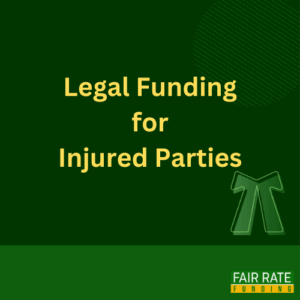Legal Funding for the Injured is a Lifeline
Involvement in a personal injury lawsuit, whether through a car accident, medical malpractice, workplace injury, or other, the physical, emotional, and financial toll can be substantial. Beyond dealing with medical recovery, many injured individuals face a lengthy legal battle in pursuit of fair compensation. Unfortunately, bills don’t wait for cases to resolve. Legal funding for injured parties provides a financial lifeline while lawsuits progress. In this post, we examine what legal funding is, how it works, who qualifies, and weigh the pros and cons for injured plaintiffs seeking use of these specialty financial transactions.
What Is Legal Funding for Injured Parties?

Legal funding for injured parties — also known as pre-settlement funding, lawsuit loans, or litigation financing— is a form of non-recourse cash advance provided to plaintiffs involved in pending personal injury lawsuits. This funding helps cover essential expenses while the legal process unfolds, which may take months or even years.
Unlike traditional loans, legal funding is contingent upon the lawsuit’s success. If the plaintiff wins or settles the case, the funding company is repaid from the settlement proceeds. If the case loses, no repayment is required.
This unique financial opportunity affords plaintiffs the ability to endure case delays which are inherent in the judicial system. It allows them to keep monthly expenses current and avoid cash flow problems which can arise when personal injuries occur.
Unlike traditional loans, no periodic payments are made. The advance is actually a sale of future proceeds by the plaintiff to a lawsuit funder. Repayment is made at the conclusion of the case at the time of disbursement.
Why Injured Plaintiffs Seek Legal Funding
Lawsuits can disrupt plaintiff’s lives in a variety of ways. Legal funding presents a solution to the following disruptions:
Lost Income
Many injured plaintiffs are unable to work — either temporarily or permanently — resulting in lost wages and financial instability.
Mounting Medical Bills
Although workers’ compensations, bodily injury insurance coverages for auto accidents, and other benefits are helpful, they are often limited. Co-payment amounts, deductibles, and uncovered treatments not covered by policies can quickly pile up, leaving injured parties in financial trouble.
Housing and Utility Expenses
Mortgage or rent payments, utility bills, and daily living expenses still need to be paid regardless of a plaintiff’s financial state. Legal funding for injured parties helps pay housing costs while the case progresses through the legal system.
Leverage in Settlement Negotiations
Insurance companies often pressure financially stressed plaintiffs into settling early simply to avoid financial stress. Rejecting low-ball settlement offers is a legal funding benefit which allows plaintiffs to make ends meet while their attorneys secure just compensation.
How Legal Funding for Injured Parties Works
The process for obtaining legal funding is relatively straightforward. Lawsuit loans work as follows:
1. Case Evaluation
The injured party contacts a legal funding company and provides details about the case. The company then works with the plaintiff’s attorney to compile paperwork and underwrite the strength of the claim.
2. Approval
If the funding company believes the case has strong merit and a high likelihood of settlement, it will offer a cash advance. Approval often takes 24-72 hours.
3. Funding Agreement
A lawsuit loan contract is signed, outlining the amount advanced, fee structure, and repayment terms. Importantly, these are non-recourse agreements which means if the case is unsuccessful, no repayment is required.
4. Funds Disbursed
Once approved, funds are sent via electronic funds transfer (EFT) or and overnight check. Plaintiffs can use the funds for any personal expenditure.
5. Repayment Upon Settlement
When the case resolves, attorneys repay the funding company from their attorney trust account. If the plaintiff does not win the case, they owe nothing.
If You Have Any Questions, Call 888-964-2224
WE ARE HERE TO HELP YOU!
Who Qualifies for Legal Funding?
Not all plaintiffs or lawsuits are eligible for funding. Eligibility is typically based on:
- Type of case – The most common lawsuit funding type is personal injury cases such as auto accidents, slip-and-fall incidents, medical malpractice, product liability, and wrongful death.
- Strength of the claim – Funding companies look for cases with a high probability of success.
- Legal representation – Plaintiffs must have an attorney working on a contingency basis (i.e., no fees unless the case is won).
- Settlement potential – The expected value of the settlement must be high enough to repay the funding plus fees.
Benefits of Legal Funding for Injured Parties
Legal funding offers multiple advantages for those struggling financially while pursuing legal justice:
1. No Credit Checks or Employment Requirements
Unlike traditional loans, funding decisions are based on the strength of the case, not the applicant’s credit score, employment history, or income.
2. Risk-Free Funding
Since the funding is non-recourse, the injured party owes nothing if the case is lost. This makes it a relatively low-risk solution.
3. Fast Access to Cash
Once approved, plaintiffs often receive their funds within 24-48 hours. This immediacy can be crucial for those behind on bills or facing foreclosure or eviction.
4. Helps Avoid Low-Ball Settlements
Legal funding empowers injured plaintiffs to reject inadequate offers and hold out for a more just settlement, often resulting in a better financial outcome.
Costs and Considerations
While legal funding can be a financial lifeline, it’s important to understand the costs involved:
Legal funding typically carries higher fees than traditional lending because of the risk the company assumes. Lawsuit funding costs are either fixed or accrue over time, often expressed as a monthly rate or compounded interest.
The longer the case takes to settle, the more the repayment amount grows. It’s important to ask for a detailed fee structure before signing any agreement. Because the funding plus fees are deducted from the final settlement, plaintiffs may receive less money at the end of their case.
Choosing Legal Funding for Injured Parties
Not all legal funding providers are created equal. Injured plaintiffs should do their research and consider the following when selecting the best lawsuit funding company:

- Transparent fee structure
- No hidden fees or compounding interest
- Strong reputation and positive legal funding reviews
- Quick turnaround time
- Clear and easy-to-understand contracts
- Willingness to work directly with your attorney
Plaintiffs can ask questions to gain a better understanding of lawsuit funding transactions. These can include:
- “What happens if I don’t win my case?”
- “What are the total repayment costs after 6 months? 1 year?”
- “Are there any upfront fees or penalties?”
Why Choose Fair Rate Funding
You obviously have a choice in who you use for legal funding. We offer:
- Simple and Easy Process – Approval only on the strength of your case.
- Risk – Free Proposition – Only repay if you win your case.
- Rapid Approval and Funding – Approvals often within 24 hrs.
- Up Front Pricing – Absolutely no hidden fees.
Give us a call and learn about your options. We are here to help and are at your service.
Common Misconceptions About Legal Funding
Legal Funding as Loans
While often called a “lawsuit loan,” legal funding is technically not a loan. Instead, it’s an advance against your potential settlement and is only repayable if you win. Legal funding for injured parties is a financial transaction where the plaintiff sells a portion of the future settlement or recovery. Funding companies purchase the proceeds ahead of time. They do not loan money to plaintiffs.
Legal Funding is Only for Large Lawsuits
Even moderate personal injury cases can qualify for legal funding. Companies often provide advances ranging from a few hundred to tens of thousands of dollars.
Legal Funding Hurts Your Case
Some fear that obtaining legal funding might reflect poorly on their lawsuit. In reality, reputable legal funding providers work discreetly and in partnership with attorneys to ensure that the case remains unaffected. Funders do not participate in case strategy or other decisions affecting the case’s outcome.
The Attorney’s Role
Legal funding companies work closely with the plaintiff’s attorney throughout the process. In fact, attorney cooperation in lawsuit funding is essential. Attorneys must:
- Provide documentation about the case
- Share updates on settlement progress
- Agree to disburse funds to the provider from the final settlement
Again, reputable funding companies will never interfere with the legal strategy of the case. Good attorneys represent the interests of their clients first. They should not be pressured by any other party, regardless of whether they have an interest in the outcome.
Alternatives to Legal Funding
While legal funding for injured parties is helpful, plaintiffs could also consider other lawsuit loan alternatives. These might include:
- Borrowing from family or friends
- Negotiating payment plans with creditors
- Seeking community assistance or disability benefits
- Using personal savings (if available)
Each alternative carries its own pros and cons, but for those with few resources, legal funding remains a practical solution.
Conclusion
Legal funding for injured parties offers critical support for plaintiffs facing long legal battles and financial distress. It bridges the gap between injury and compensation, enabling individuals to meet their basic needs and pursue justice without being forced into premature settlements. When used strategically and with legal counsel’s input, legal funding can be a powerful tool for leveling the legal playing field.
Thank you for your interest in Fair Rate Funding.

